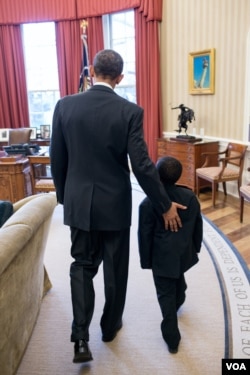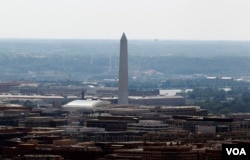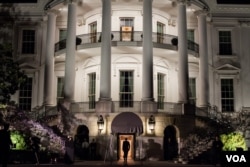Student Union
No, You Will Not Meet Obama in DC: Keith's Story
As we waited outside the international center for our taxis to arrive, up came Alex, dragging a large casket. “Good morning, guys?” he said, guiltily. He always had the air of a spy about him, and the dead body-sized case didn’t help. I rushed to open the large casket, grabbing the bag with my claws. I clipped it open and saw bags of Lays, Doritos and Oreos. “That’s my food for the next five days!” he said, smiling. “Oh! So where did you put the dead body...?” I joked.
I had brought only a small satchel, in which I’d stuffed three pairs of clothes and my tiny laptop. I planned on wearing the same socks until they smelled as bad as my excitement!
This would my first time leaving Rock Hill since I got to Winthrop in August. I was especially looking forward to the rendezvous I planned to have with President Obama. I had tons of stories to tell him about Africa. And I had stayed up all night, yawning and drooling on my desk, writing a sonnet for the occasion called “Yes We Can!”
We ended up in two taxis, crammed up in our seats, staring out as the sleepy town of Rock Hill slipped away in the rearview. Walgreens, Earth Fare, Bi-Low, B.P.
We took the taxis to Charlotte, where we boarded an Amtrak train to D.C. In my country I’d never travelled by train, in fact our trains were virtually dead. Most people travelled in kombis, or mini-buses; overstuffed with people, livestock, bicycles, and gossip. Public transport was a drag; full of endless stops by pot-bellied police officers soliciting for bribes; full of complaints about hardships.
I tried sitting next to Alex, so we could have some political discussions, but he soon fled like a fugitive saying, “You talk too much! You are annoying!” before slipping down the aisle, dragging his dead body. He sat next to a stranger who stared daggers at him on seeing the oversized suitcase.
A crazy lady sat next me. “When I get there, tell them I don’t want any trouble!” she shouted over her phone. “I just been in prison!! And I don’t want to go back coz o’ somethin' stupid! Are we clear!?” She hung-up. “So how’re y’a doing, darling?” she said to me, staring at me with sharp eyes.
After several hours, we finally got to Washington. We looped our way through underground trains before we were out in the open. “Wow!” I said, standing in front of everyone else. “D.C.’s quiet, and quaint!” It wasn’t quite the psychedelic D.C. I’d had in mind; an adrenaline-charged, action-packed metropolis with sirens, guns and excitement; it was something more elaborate. It was quiet. Peaceful. Nice!
D.C. is more of an administrative capital. Our own 7-story campus apartments looked elaborately taller than most of the buildings that I saw. But that is what made the city so spectacular! I felt like I was in a mini-city, a splendid Legoland stretching for eons. And was itching to explore!
After putting down our luggage at Hotel Harrington we found ourselves trotting across D.C., towards the White House, and I started to think about my rendezvous with President Obama, in the Oval Office. I would tell him how he is a symbol of hope, not only for Americans, but for people around the world; under the sea of flashlights, and news reporters. Then I’d hand him my poem, “Yes We Can!”
One of the girls we were traveling with was putting her enthusiasm for food to use with each new monument we passed. She licked the horses and fake people like ice-cream, making strange poses for the pictures she planned to post on Facebook.
“This one is going to be called Vanilla! That one Noodles... that one... I’ll tag all of you!..”
Alex, on the other hand hated the slow pace everyone else had adopted. He marched on like a soldier, staring ahead with his stoic eyes and probably thinking, “Those imbeciles! They get carried away by statues and rocks!”
We walked past herds of students who were also on spring break. They’d probably already bathed in the honor of seeing President Obama, I thought. Now it was our turn! It was our turn to see the maverick, with a million-dollar smile, and an infinite vision.
I held onto my poem. I felt it singing to me as I approached the White House.
“Excuse me.” said the guard. “You can’t go any further. The road is closed.”
I exclaimed in disbelief. “Does that mean...??? We can’t see the President?”
“I’m afraid so.”
I held onto the poem, and felt the weight of millions of prayers melting.
But, as I looked down at the Washington Monument, a tall obelisk staring into the heavens like a torch, I felt my hopes burning again. I was going to be in D.C. for the next five days, exploring the monuments. I was going to eventually give President Obama this sonnet, and let the prayers of millions of Africans sing along like a song. “Yes We Can!” echoed the sonnet in my hand.
It might not surprise you to find out that Keith did not get to meet President Obama on his trip. I asked him whether he really expected to be able to march into the White House and greet the president:
“I guess meeting Obama was somewhat between my overactive imagination... and an actual wish and hope. I feel silly in retrospect.”
Did it ruin your trip?
“I must admit not meeting the president did sort of ruin the trip in some way, because I was somewhat childishly hopeful. But I still found joy in the trip: seeing the monuments, eating in strange restaurants and trying sushi for the first time.”
Yes We Can, by Keith Mushonga
At the Summit of the White House you fly
Like an Eagle with wings open so wide
Your eyes see so far and beyond our sky
Guarding us like little chicks inside.
Before, It was a dream floating astream
When the world was thirsty for some hope
So our hope washed the dream, slowly downstream
And gave us more reason to sail the globe.
“Yes we can!” marched many in the streets
Packed up in podiums, with sorrows at hand,
Lost jobs lost health, all our rights in pitiful pits!
But then we marched twice to that same Summit
And found hope blooming like a blade of Wheat
Have you had any interesting travel experiences? Tell us about them in the comments, or use the form below.
Loading...
See all News Updates of the Day
With federal student aid delays, students aren’t sure what college will cost
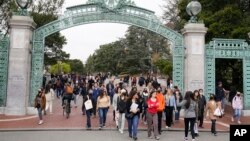
The U.S. Department of Education’s federal student aid form (FAFSA) experienced serious glitches and delays this year.
Now, many students have been admitted to college, but don’t know how much money they’ll need to attend.
Read the story from Susan Svrluga and Danielle Douglas-Gabriel for The Washington Post. (March 2024)
Senator draws attention to universities that haven’t returned remains
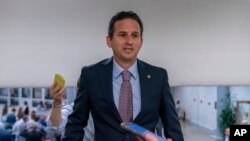
More than 70 U.S. universities continue to hold human remains taken from Native American burial sites, although those remains were supposed to be returned 30 years ago.
Jennifer Bendery writes in Huffington Post that one senator has been using his position in an attempt to shame universities into returning remains and artifacts. (April 2024)
COVID forced one international student to go hungry
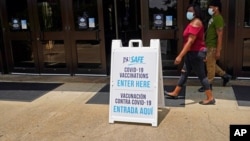
When Samantha (not her real name) enrolled in community college in the U.S., her family at home in South Africa scrimped and saved to support her.
But the COVID-19 pandemic hurt the family’s finances, and at one point Samantha had four on-campus jobs just to make ends meet. Many in the U.S. believe international students are wealthy sources of funding for universities, but stories like Samantha’s suggest otherwise.
Andrea Gutierrez reports for The World. (March 2024)
Tips for paying for a STEM degree as an international student
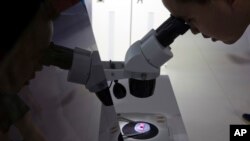
For US News & World Report, Melanie Lockert describes how to calculate the cost of a STEM degree, and where to find funding. (March 2024)
NAIA all but bans its transgender college athletes from women's sports
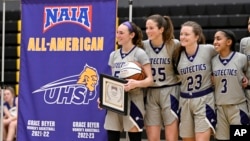
The National Association of Intercollegiate Athletics, the governing body for mostly small colleges, announced a policy Monday that all but bans transgender athletes from competing in women's sports.
The NAIA's Council of Presidents approved the policy in a 20-0 vote. The NAIA, which oversees some 83,000 athletes at schools across the country, is believed to be the first college sports organization to take such a step.
According to the transgender participation policy, all athletes may participate in NAIA-sponsored male sports but only athletes whose biological sex assigned at birth is female and have not begun hormone therapy will be allowed to participate in women's sports.
A student who has begun hormone therapy may participate in activities such as workouts, practices and team activities, but not in interscholastic competition.
"With the exception of competitive cheer and competitive dance, the NAIA created separate categories for male and female participants," the NAIA said. "Each NAIA sport includes some combination of strength, speed and stamina, providing competitive advantages for male student-athletes. As a result, the NAIA policy for transgender student-athletes applies to all sports except for competitive cheer and competitive dance, which are open to all students."
There is no known number of transgender athletes at the high school and college levels, though it is believed to be small. The topic has become a hot-button issue for those for and against transgender athletes competing on girls' and women's sports teams.
At least 24 states have laws barring transgender women and girls from competing in certain women's or girls sports competitions. Last month, more than a dozen current and former college athletes filed a federal lawsuit against the NCAA, accusing the sports governing body for more than 500,000 athletes of violating their rights by allowing transgender women to compete in women's sports.
The Biden administration originally planned to release a new federal Title IX rule — the law forbids discrimination based on sex in education — addressing both campus sexual assault and transgender athletes. But earlier this year, the department decided to split them into separate rules, and the athletics rule now remains in limbo even as the sexual assault policy moves forward.
Hours after the NAIA announcement, the NCAA released a statement: "College sports are the premier stage for women's sports in America and the NCAA will continue to promote Title IX, make unprecedented investments in women's sports and ensure fair competition for all student-athletes in all NCAA championships."
The NCAA has had a policy for transgender athlete participation in place since 2010, which called for one year of testosterone suppression treatment and documented testosterone levels submitted before championship competitions. In 2022, the NCAA revised its policies on transgender athlete participation in an attempt to align with national sport governing bodies, following the lead of the U.S. Olympic and Paralympic Committee.
The three-phase implementation of the policy included a continuation of the 2010 policy, requiring transgender women to be on hormone replacement therapy for at least one year, plus the submission of a hormone-level test before the start of both the regular season and championship events.
The third phase adds national and international sport governing body standards to the NCAA's policy and is scheduled to be implemented for the 2024-25 school year on August 1.
There are some 15.3 million public high school students in the United States and a 2019 study by the CDC estimated 1.8% of them — about 275,000 — are transgender. The number of athletes within that group is much smaller; a 2017 survey by Human Rights Campaign suggested fewer than 15% of all transgender boys and transgender girls play sports.
The number of NAIA transgender athletes would be far smaller.




